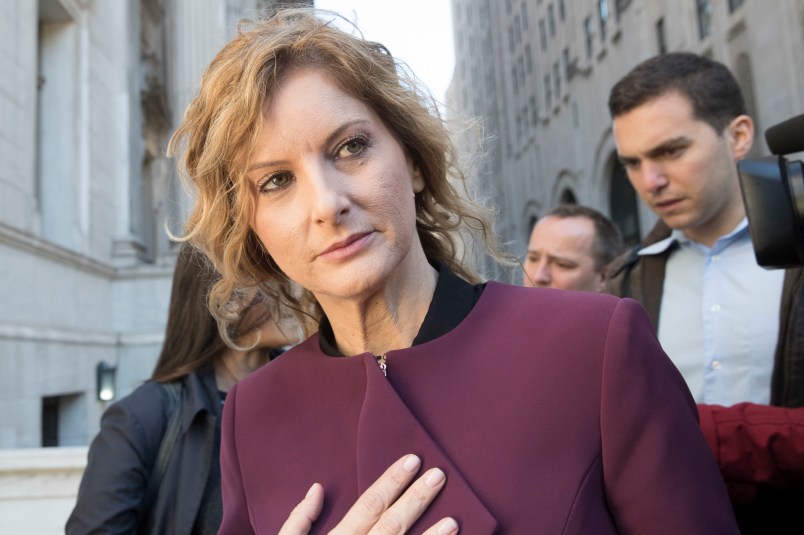NEW YORK (AP) — Appeals court judges weighing President Donald Trump’s bid to shut down a former “Apprentice” contestant’s defamation suit against him are asking a hypothetical question: Could a New York court order the president to jail if he were to buck an order in the case?
The question came up — but wasn’t definitively answered — as lawyers for Trump and ex-contestant Summer Zervos argued Thursday in a New York appeals court.
Zervos sued Trump for calling her a liar after she accused him of unwanted kissing and groping in two incidents in 2007. Trump’s lawyers are trying to get the case dismissed or delayed until after his presidency.
Thursday’s court session focused on one of the Trump legal team’s central arguments: that a sitting president can’t be sued in a state court over conduct outside official duties. It made for a discussion largely about Constitutional clauses and legal interpretation.
But state Supreme Court Appellate Division Justices Peter Tom and Angela Mazzarelli had some theoretical questions about practical matters: Could a president be taken to a city small-claims court? Or jailed by a state judge who could hold the commander-in-chief in contempt of court after an order was disregarded?
Trump lawyer Marc Kasowitz suggested the contempt question helped prove his point.
“I think there is something really, really telling about that argument,” he said.
Zervos’ attorney, Mariann Wang, said it’s unlikely the hypothetical scenario would ever happen and the Constitution doesn’t shield a president from state court suits over non-official conduct.
“The president does not stand above the law. He is still a human being,” she said.
The appeals panel peppered both sides with queries and, as is common, didn’t immediately issue a decision.
The U.S. Supreme Court ruled in 1997 that then-President Bill Clinton wasn’t immune from a federal sexual harassment lawsuit concerning an alleged encounter with an Arkansas state employee while he was governor. But the high court didn’t settle the question of whether a president could be sued in a state court over unofficial conduct.
During that suit, Clinton was held in contempt of court for providing what a federal judge said was misleading testimony during a deposition — a session of pre-trial questioning under oath. Clinton was fined more than $90,000.
Zervos, a California restaurateur, watched intently from the court audience, sitting forward in her seat while Wang argued her case. Outside court, Zervos didn’t comment on the case but asked the public to contribute to a GoFundMe page to help pay her attorneys.
“They’ve worked very hard, and they haven’t been paid up until this point,” she said.
Zervos appeared on “The Apprentice” in 2006, when Trump was the reality show’s host. She says she met with him twice the next year, seeking career advice but getting unwelcomed kisses and groping.
According to her lawsuit, she didn’t broach the encounters publicly for years because she thought they were isolated episodes of bad behavior by a businessman she admired. She went public with her allegation after an “Access Hollywood” recording emerged in October 2016 of Trump boasting about groping women.
Trump — by then the Republican presidential nominee — denied Zervos’ claims and retweeted a message calling them “a hoax.”
He also launched broadsides on Twitter and on rally stages against all the dozen-plus women who broached sexual misconduct claims against him around that same time, calling them “liars” peddling “totally made-up nonsense to steal the election,” among other comments.
Zervos’ lawyers say his comments were factual falsehoods that subjected her to threats and made her restaurant lose business. Trump’s lawyers say his remarks were opinions that he had a free-speech right to express in the course of politics.
Zervos is seeking a retraction, an apology and compensatory and punitive damages. Like Trump, she is a Republican.
Both sides have continued gathering evidence while they await the appeals court’s decision on whether the case can proceed, and they have been clashing over the scope of documents they should have to provide one another.
A Manhattan court is set to hear arguments on those issues next week.



